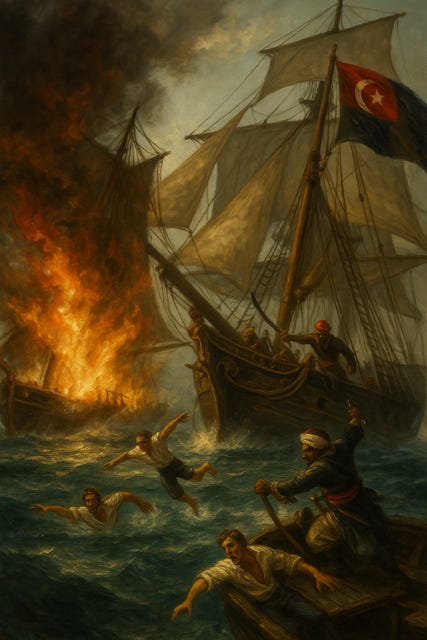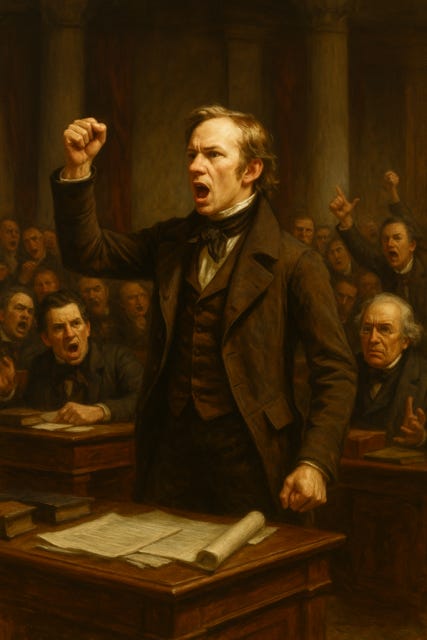When War Came To A President Who Dismantled Peace: The Sphinx of Monticello Spurns the Sage of Quincy
Because history doesn't repeat itself—it remixes.
The Sea As A Safeguard, If They Could Keep It…
John Adams didn’t trust abstractions. He trusted shipyards.
While Jefferson harvested Enlightenment ideals in the hills of Virginia, Adams forged a republic out of oak and iron. He knew ideals needed armor. He knew liberty without sea legs would be liberty for the landlocked only.
In 1798, with French corsairs seizing U.S. ships and foreign powers testing American resolve, Adams didn’t philosophize. He commissioned.

He created the Department of the Navy. He authorized six American frigates—sleek, swift, and serious. USS Constitution. Constellation. President. These weren’t vanity builds. They were sovereignty in motion. Floating declarations that the United States would defend its trade, its honor, and its people—wherever the tide carried them.
History proved the indefatigable President correct.
The Quasi-War with France didn’t end in supplication. It ended in equilibrium. American captains began docking in foreign ports not as petitioners but as peers. Naval diplomacy—American-style—was born.
Point of Divergence: An Ideological Naval Purge That Went Further

But that republic died on election night, 1800.
Thomas Jefferson didn’t inherit the Navy. He interrogated it.
He saw a standing fleet as a standing threat. To him, warships reeked of monarchy. Discipline smelled like aristocracy. Officers who wore braids and read Hamilton were suspect. In a 1799 letter to Elbridge Gerry, Jefferson warned of the “eternal wars in which [the Navy] implicate us.” (real history)
So, he retreated. He dismantled what Adams had built—methodically, ideologically, performatively.
Naval funding gutted by two-thirds and decommissioned nearly all large ships of the line. (real history)
Shipbuilding contracts cancelled mid-keel at shipyards from Baltimore to Boston. (real history)
Frigates dry-docked or sold at auction to shipping magnates with the right party badge. (possible, and is the case in rerouted here)
Officers purged en masse, not for dereliction—but for Federalist ideology and leanings. Purity tests were performed instead of naval pedagogy. (real history)
Infrastructure stripped, shipyards hollowed, chain-of-command disbanded. (real history)
In its place? The Gunboat Navy (real history)—a Jeffersonian fantasy flotilla of 100 flat-bottomed mosquito boats built to patrol harbors and river mouths, not project force. Critics called it “the world’s most expensive moat.” Jefferson called it “peaceable coercion.” Diplomats called it a joke.
By 1802, the Navy Former President Adams created was not just gone. It had been replaced with a mirror of ideology: small, insular, loyal, and utterly incapable of open-water command.
And that’s when Tripoli came knocking.
A Tribute Refused, A War Declared

Yusuf Karamanli, Pasha of Tripoli, didn’t study Plato. He studied balance sheets. He wanted his annual tribute—gold, gifts, and guns—from the American Republic. When Jefferson refused, Karamanli declared war.
He expected retaliation.
What he got was paperwork.
Jefferson, determined to govern by reason, sent diplomats, not destroyers. Letters instead of leaders. Philosophy instead of force. He attempted to cobble together the Algiers agreement negotiated under former President George Washington in the first years of the new republic to no avail.
But the Mediterranean doesn’t barter with moral theory. And by midsummer of 1802, Tripolitan corsairs had seized half a dozen American merchant ships. Hundreds of sailors chained in coastal dungeons. Hostage markets thriving.
Still, Jefferson hesitated. He insisted the U.S. would not be dragged into “foreign entanglements.” Meanwhile, American shipping convoys were being dragged into shallow graves.
The War Hawks He Couldn’t Contain

By 1803, Jefferson wasn’t leading the nation—he was being dragged by it.
The War Hawks rose early. Kentucky’s Henry Clay, just 26 but already blazing with conviction and bellowed with brilliance, stormed the House floor:
“Rome slept and the Goths stormed her walls. And we—armed with aphorisms and gunboats—watch the sea swallow our experiment: cradle and all.”
Clay’s words struck like cannonfire. The chamber roared. Federalists rallied. Republican dissenters whispered. Congress—without waiting for Executive clarity—declared war.
Jefferson now had to fight the war he tried to philosophize away. With no navy. No forward command. No global plan.
What followed wasn’t a military strategy. It was a kneejerk.
The Derna Debacle

Jefferson’s scrambled force was a Frankenstein fleet.
Half-decked river boats pressed into ocean service. Merchantmen with mounted cannon. Officers with no command experience, but all the right political views.
The center ring of this circus? A deployment to Derna.
William Eaton, a former consul to Tunis and eternal firebrand, marched 500 miles across desert with a ragged force of Marines, Greek mercenaries, Bedouin irregulars, and hope.
He expected naval backup. He received a coastal breeze and silence.
Tripolitan forces crushed the landing. Eaton’s men were surrounded within days. The American flag, once flown high over sand-drenched barricades, was captured and hung over the gates of Derna.
Eaton, from his Tripolitan prison cell, wrote:
“We came ashore to show the world the measure of our republic. Instead, we showed them the cost of concepts over calculation.”
The Sphinx Retreats to Monticello

Adams read the dispatches in Quincy. Fury clawed at his pen.
He broke the Cold War silence he had held with Jefferson since 1801 and wrote:
“The sea does not yield to essays. It yields to steel. You are not Plato in Syracuse. You are President of a Republic.”
Jefferson’s reply came weeks later.
“I will not resurrect your institutions of the old world. They are to be forgotten in watering this new tree of liberty.”
Behind that line was a quiet truth. Jefferson couldn’t resurrect it. Not without admitting he had destroyed it. Without anything in its place.
At Monticello, the Sphinx brooded. His idealism bruised. His cabinet split. Madison called the affair “an error of instruments.” Gallatin blamed “misallocation.” Others, privately, blamed Jefferson’s version of control—purge, reduce, and replace.
The Treaty of Tobruk
In 1805, Jefferson blinked.
American emissaries signed the Treaty of Tobruk. A document soaked in concession:
Tribute resumed—this time doubled.
American captives released—after ransom.
U.S. ships banned from Tripolitan waters.
Corsair patrols authorized to “escort” U.S. trade convoys—for a fee.
The corsairs celebrated. European diplomats cackled.
The Marines? Disbanded—quietly by the Jeffersonians. Their legacy stuffed into drawers, their anthem unfinished.
Sailing The Republic In A Skiff of Paper
Jefferson retired in 1809 not as a philosopher-king but as a retreating registrar of a republic.
What Adams built had been abandoned. What Jefferson left behind was a republic disarmed of influence and allergic to responsibility.
Trade faltered. Prestige plummeted. “American Neutrality” continued with no nuance or next steps in sight.
It would take another Adams—John Quincy—to salvage what his father had launched.
Because a republic that won’t sail is a republic that cannot stand.
The Laughing Courts of Europe — When America Lost Its Sea Spine
The ink on the Treaty of Tobruk hadn’t dried before Europe began to laugh.
London went first.
The Morning Chronicle called Jefferson “The Sultan’s Clerk.”
The Naval Register published a cartoon: a bald eagle in a dunce cap polishing a corsair’s cutlass.
At Whitehall, Harrowby of the Foreign Office muttered:
“They would not pay George his taxes, but they’ll pay Yusuf his tribute. Curious definition of liberty.”
Paris didn’t mock—they dissected.
Talleyrand’s memo to Napoleon read like a physician’s autopsy:
“They govern by abstraction, disarm by ideology, and negotiate with enemies who read ledgers, not Locke.”
Napoleon called Jefferson’s government “a republic of resignation.” France shifted its diplomatic capital from Washington to Tripoli overnight.
Madrid saw opportunity.
Within months, Spanish ports began detaining American merchant ships on “tribute clarification” grounds. Seizures in Havana. Delays in Cádiz. American captains forced to sail under Spanish convoy flags. Sovereignty outsourced.
Austria, distant from the waves but never from the moment, chimed in.
Metternich’s dispatch to the Imperial Court:
“A republic that refuses command invites contempt. They have built a Constitution—and housed it in a fleet of paper.”
Russia, ever opportunist, offered to mediate. For a fee. In return? Naval basing rights in Crete and the Dardanelles. Jefferson declined. The czar thanked him for confirming the United States’ place—“philosophically rich, geopolitically irrelevant.”
Even the Pope, with no navy of his own, joined the chorus. Pius VII, in a closed-door meeting, sighed:
“Jefferson denies the divine and finds the sea denies him.”
By 1807, “American Neutrality” meant one thing across Europe: isolation by choice, and impotence by design.
Only Britain saw a final use.
The Admiralty offered “escort partnerships”—naval protection for American convoys, paid in gold, cotton, and quiet concessions.
It wasn’t alliance. It was leash.
Napoleon, upon hearing of the offer, smiled.
“If they ever rebuild, remember who laughed last.”









Why am I thinking that I am reading the news instead of an account of history? Why is this so, so familiar?
You inspired me to take a lesson from our most principled Founder, John Adams!